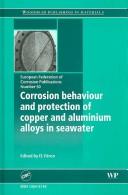| Listing 1 - 2 of 2 |
Sort by
|

ISSN: 13545116 ISBN: 1845693086 1845692411 9781845693084 1306381665 9781306381666 9781845692414 9781420054095 1420054090 Year: 2007 Publisher: Boca Raton, Florida ; Cambridge, England : CRC Press : Woodhead Publishing Limited,
Abstract | Keywords | Export | Availability | Bookmark
 Loading...
Loading...Choose an application
- Reference Manager
- EndNote
- RefWorks (Direct export to RefWorks)
Copper and aluminium alloys are widely used in marine engineering in areas such as pipelines, storage tanks, ships' hulls and cladding for offshore structures. This important book reviews key factors affecting the corrosion and service life of these materials in the marine environment. The book is divided into five parts, with part one reviewing key aspects of the corrosion behaviour of both these alloys. Part two discusses the use of copper and copper-nickel alloys in seawater, whilst Parts 3 and 4 cover aluminium bronzes and alloys. The final section of the book covers the use of aluminium-b
Seawater corrosion --- Copper alloys --- Aluminum alloys --- Corrosion --- Light metal alloys --- Alloys --- Marine corrosion --- Corrosion and anti-corrosives
Book
ISBN: 3036558624 3036558616 Year: 2022 Publisher: Basel MDPI - Multidisciplinary Digital Publishing Institute
Abstract | Keywords | Export | Availability | Bookmark
 Loading...
Loading...Choose an application
- Reference Manager
- EndNote
- RefWorks (Direct export to RefWorks)
Marine corrosion is a very ancient topic, as humankind has, since antiquity, struggled with the corrosiveness of seawater to exploit the countless and essential natural resources of the sea. It is also a broad topic because it combines chemical, biological, and mechanical factors. Among the numerous materials used for marine applications, iron-based alloys (i.e., steels) are essential in various industrial domains such as (of course) the naval industry (ships, submarines, etc.), the energy industry (pipelines, offshore platforms, renewable energy devices, etc.), and buildings (seaport structures, bridges, steel reinforcement in concrete, etc.). Marine corrosion is still an issue to this day, and the recent and necessary development of marine renewable energy devices has motivated innovative research. Currently, complete mastery of corrosion issues is a key aspect in the profitability of produced energy. Simultaneously, the requirements for environmentally friendly anticorrosion methods and processes are clearly expressed. Numerous fundamental and recent advances in marine corrosion and protection of steels, including carbon steel, low alloy steel, and stainless steel, can then be noted. This Special Issue is necessary to acknowledge the recent and sudden increase in the understanding of steel corrosion processes in marine environments and the associated optimization of anticorrosion methods. Last but not least, a large part of our cultural heritage lies at the bottom of seas and oceans, and it will definitely be lost if scientific research does not include current and historical concerns as well.
Technology: general issues --- Chemical engineering --- carbon steel --- seawater --- localized corrosion --- magnetite --- green rust --- iron sulfide --- marine corrosion --- magnesium --- X-ray diffraction --- reinforcement --- corrosion --- chlorides --- progression --- alkalinity --- cracking --- metabarcoding --- MIC --- multispecies --- SRB --- marine --- composites --- electrodeposition --- superhydrophobic coatings --- zinc and zinc-alloys --- electroplating --- aerospace --- epoxy marine coatings --- accelerated ageing tests --- thermal cycling --- EIS --- corrosion degree --- steel --- microbiologically influenced corrosion --- biofilm --- bacterial activity --- mooring chain --- SEM --- corrosion fatigue --- twin wire arc spraying --- machine hammer peening --- ZnAl4 coating --- marine application --- corrosion protection --- cathodic protection --- calcareous deposit --- marine renewable energy
| Listing 1 - 2 of 2 |
Sort by
|

 Search
Search Feedback
Feedback About UniCat
About UniCat  Help
Help News
News